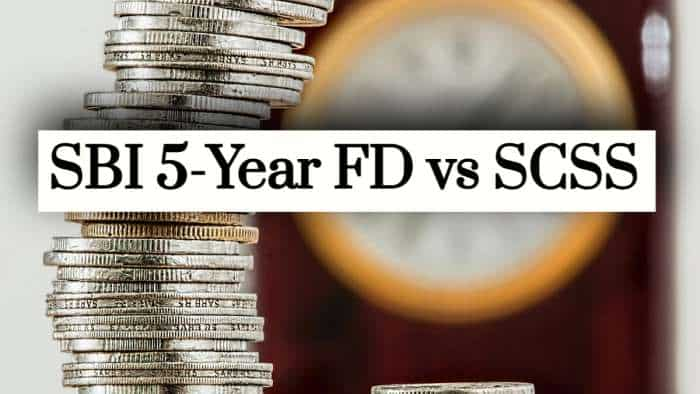RBI MPC Decision: Rs 10k cr! Additional special liquidity facility for NHB, NABARD - Check details
Governor Das confirmed that Rs 10,000 cr additional liquidity facility is to be provided by NHB, NABARD.

Reserve Bank of India (RBI) Governor Shaktikanta Das on Thursday, during the Monetary Policy Committee press conference, made a big announcement pertaining to additional liquidity facility to be provided by National Housing Bank (NHB) and National Bank for Agriculture and Rural Development (NABARD). Governor Das confirmed that Rs 10,000 cr additional liquidity facility is to be provided by NHB, NABARD.
Giving more details, Das explained, "Additional special liquidity facility of ₹10,000 crore will be provided at the policy repo rate consisting of : ₹5,000 crore to the National Housing Bank (NHB) to shield the housing sector from liquidity disruptions and augment the flow of finance to the sector through housing finance companies (HFCs); and ₹5,000 crore to the National Bank for Agriculture and Rural Development (NABARD) to ameliorate the stress being faced by smaller non-bank finance companies (NBFCs) and micro-finance institutions in obtaining access to liquidity."
The Reserve Bank of India (RBI) on Thursday kept interest rates unchanged to help tame inflation that in recent times had surged past 6 per cent mark, and said that the economy is in an extremely weak condition following the pandemic. The central bank also allowed lenders to restructure corporate and MSME loans as well as raised the limit of loans that can be availed against gold ornaments and jewellery. After cutting interest rates by 115 basis points since February, the Monetary Policy Committee (MPC) after three days of deliberations voted unanimously to leave the policy repo rate unchanged at 4 per cent.
The MPC also decided to "continue with the accommodative stance of monetary policy as long as necessary to revive growth, mitigate the impact of COVID-19 while ensuring that inflation remains within the target" zone, RBI Governor Shaktikanta Das said.
"Given the uncertainty surrounding the inflation outlook and extremely weak state of the economy in the midst of an unprecedented shock from the ongoing pandemic, the MPC decided to keep the policy rate on hold," he added. Das said the central bank would remain "watchful for a durable reduction in inflation to use the available space to support the revival of the economy." While, economic activity had started to recover from the lows of April-May, a surge in fresh infections have forced re-clamping of lockdowns in several cities and states to "level-off" various high-frequency indicators.
The six-member MPC saw upside risks to food prices and elevated headline inflation during July-September, which would ease in the second half of the 2020-21 fiscal. It forecasts a contraction in real GDP growth for the April 2020 to March 2021 fiscal.
WHAT EXPERTS SAY: COMMENTS
CII President Uday Kotak statement on the Fifth Bimonthly Monetary Policy
"CII welcomes RBI’s announcements post the monetary policy committee meeting that have effectively addressed some of the crucial issues that industry is facing due to the pandemic and frequent lockdowns which have disrupted supply chains. Mr Uday Kotak, President, CII, said that “Given that the RBI has already reduced the repo rate significantly leading to increased liquidity, the decision to keep the rate unchanged at 4.0 per cent today is understandable. It is heartening to note that the successive reductions in the repo rate since February 2020 have been transmitted to the real economy in the wake of comfortable liquidity conditions. These are encouraging signs indeed and bodes well for charting the recovery path for the industry”.
Industry is encouraged by RBI’s decision to provide a window under the Prudential Framework to enable lenders to implement a resolution plan in respect of their corporate exposures, with the necessary caveats in place. It is to be hoped that the expert committee led by Mr K V Kamath will come out with norms that will enable banks to judiciously monitor businesses while enforcing timely payments as per the restructuring plan. Sectors that are highly stressed due to the impact of COVID are in dire need of such restructuring.
The restructuring of MSME accounts will provide the necessary relief to the MSME sector which has experienced one of the most severe impact resulting from the conditions of lockdown, containment, reverse migration, supply chain and trade choking etc, due to COVID,” Mr Kotak said. The additional liquidity infusion for NHB and NABARD too is a step in the right direction, he said.
Commenting on the RBI Monetary Policy announcement, Ashish Pahariya, Associate Partner, DSK Legal, said, "RBI’s action to permit one-time restructuring will prevent explosion of defaults and insolvency situations after the end 6 months moratorium in August end. One-time restructuring which permits payment moratorium upto 2 years will give a longer time horizon to deal with the stress due to covid 19. As the accounts will continue to be classified as standard asset, this will not put pressure on the lenders provisioning requirements. Also, availability of additional finance window pending finalization of restructuring will help many corporates to deal with immediate working capital requirements. Rightly so, as this restructuring is aimed at providing relief to the accounts facing difficulties directly due to covid-19, RBI has not made this one-time window available to the borrowing accounts being in default for more than 30 days as on March 1, 2020."
Commenting on the RBI Monetary Policy announcement, Shanti Ekambaram, Group President – Consumer Banking, Kotak Mahindra Bank, said, "The Monetary Policy Committee unanimously decided to keep all key rates - repo, reverse repo, MSF and the bank rate unchanged. This is against the backdrop of rate cuts having been front loaded since February this year, inflation trending above 6% and likely to remain elevated in Q2, ample liquidity in the system and better transmission of rates. This pause also gives the MPC the option of effecting a future rate cut when inflation falls and based on how the economy progresses. . The MPC has also maintained its accommodative stance."
Shanti Ekambaram added, "While most countries globally are struggling with growth, liquidity has been ample and there has been buoyancy across markets. Emerging markets, including India, have seen significant inflows which has kept currencies stable. The RBI Governor reiterated that GDP growth is expected to be negative in Q2 and for the year and inflation is likely to trend much lower in H2 this fiscal. High frequency data shows better traction in June/July and the rural markets are likely to be stable given a normal monsoon."
Shanti Ekambaram further said, "The much-awaited restructuring scheme for the MSME sector was announced, which will provide additional relief to a sector deeply impacted by COVID-19. Other measures such as increasing the permissible loan to value ratio (LTV) for gold loans to 90 percent till March 31, 2021, will help households facing a cash crunch."
"Overall, the policy was on expected lines and in keeping with the current market and business environment," Shanti Ekambaram.
Mohit Goel, CEO, Omaxe Ltd.
"With sharp reduction in policy rates announced since March, a pause was always on the cards. But we expected the apex bank to announce some measures like restructuring of loans, which could have reduced the stress on the sector and given boost to demand. However, the decision to constitute an Expert Committee under imminent banker KV Kamath to recommend financial parameters, along with the sector-specific benchmark for resolution plans is a welcome step. The infusion of Rs 5000 crore in NHB is also a step in the right direction to boost liquidity."
Dhruv Agarwala, Group CEO, Housing.com, Makaan.com and Proptiger.com
"As the economy is still to recover to pre-covid levels and the risk to aggregate demand in the near future remains high, it is important that the transmission of past rate cuts are more effectively passed on to consumers as well as industry. However, It is indeed heartening to hear that the average lending rates have fallen by close to 90 bps since March 2020. Additionally, the liquidity in the banking system seems to be at comfortable levels. Nevertheless, the RBI’s decision to provide additional liquidity to the tune of Rs 5,000 crore to NHB augers well for the stability of HFCs that will provide some growth impetus to the real estate sector in turn."
Manoj Gaur, MD, Gaurs Group and Chairman, Affordable Housing Committee, CREDAI (National)
"Real estate sector needs hand holding at this point in time. Though unchanged repo rate is understandable the need to have special measures in place cannot be denied. The buyers are coming back to the sector after realizing the importance of real estate asset backed by historically low EMIs, the developers too need some interventions that can help them expedite the process of development."
Amit Modi, President (Elect) CREDAI Western UP and Director ABA CORP
"Market experts predicted a repo rate cut by 25bps in today’s announcement by RBI, but fortunately the longing demand from real estate sector of loan restructuring was declared. With the consumer confidence low due to the ongoing pandemic situation, and real estate sector going through a period of strife, we appreciate the government’ efforts and keen eye to look into initiatives that will help us in generating more demand in the real estate market as well as helping millions of first time homebuyers to realize their dream. Loan restructuring will strengthen the real estate outlook for developers in the coming years and pave way for a consistent growth."
Pradeep Aggarwal, Founder & Chairman – Signature Global Group & Chairman - ASSOCHAM National Council on Real Estate, Housing and Urban Development
"It was an expected move by the RBI to keep the repo rate unchanged and it is commendable that it is doing its part to ensure that the economy stays on the right path. However, the banks have not yet passed on the benefits to the consumers, which are not benefitting the real estate sector that in turn is affecting the allied industries too. RBI should take action so that banks should extend loans to the real estate sector. Liquidity crisis has to be tackled soon as situation after Corona is dismal; this cannot happen until and unless banks take a firm decision to back the sector that has many allied industries attached to it."
Ashish Bhutani, MD, Bhutani Infra
"RBI Monetary Policy Committee has kept the repo rates unchanged, even when market experts cited the conditions being favorable for it. This decision was taken due to the signs of revival, that the MPC has observed with unlock. However, the continuous surge in cases is constantly hampering the stability that commercial real estate needs for planning the expansion, mapping the already allocated funds, driving international investments, and dispersing some amount of capital to construction and permissions required. We are hoping apex financial institutions assess the realty market closely to deliver, if not repo rate cuts then some other kind of relaxation to improve sentiments of associated stakeholders."
Uddhav Poddar, MD, Bhumika Group
"The main issue is that banks have not taken adequate steps to reduce the rates or to ease the liquidity. All the good steps taken by RBI earlier will not bear fruit if the banks don’t take necessary action at their level. Real Estate is badly affected due to the pandemic and we need support from the banks by providing adequate liquidity to the sector and providing cheap home loans to the customers, to make sure the segment can flourish again. We have to understand that real estate is an integral part of economic growth as it is the largest employment generator."
Rajat Goel, JMD, MRG World
"Repo rate cuts have been announced time and again by RBI during the last few months to combat crisis. The recent announcements made are an indication that the industries and economy have a void to fill created by 3 months of lockdown. Real estate being a sector with high-end products is vast and delivers a major impact on the overall growth of the nation. The benefits provided to this sector will have far reaching impact to the economy as a whole. We are elated government has shown support towards us with schemes like CLSS & PMAY ,realty will now be able to fully utilize its potential with the impetus provided."
Raman Gupta, Director- Branding & Construction- GBP Group
"In today’s announcement the apex bank has kept the repo rate unchanged to 4% which was an expected move to keep the economy of the country afloat amidst the pandemic. Being one of the major contributor to the economy of the country, the benefits provided to the sector will have a positive impact on the overall growth of the nation. With the schemes like CLSS & PMAY along with the low repo rates the customers are moving back towards the real estate sector. Along with providing one time loan restructuring to MSMEs we expect the apex bank to announce the same for real estate sector as well."
Lincoln Bennet Rodrigues, Founder and Chairman, Bennet & Bernard Group
"The pause in policy rates and accommodative stance reflects the central bank's concern about inflation and surplus liquidity in the banking sector. One-time restructuring for Covid-19 stressed accounts is a step in the right direction. Also, an amount of Rs 10,000 crore of additional liquidity provided to NABARD and NHB will help the NBFCs and housing sector to tide over the liquidity crisis."
"While the RBI has pumped huge amount into the financial system to encourage banks to lend more, yet loan growth has been languishing because of the economy’s slump. The interest rate should be reduced with firm liquidity measures as this is the need of the hour backed by specific fiscal measures to give much-required stimulus to the sector. However, further cut in policy rates would have definitely resulted in the much needed demand booster ahead of the festive season."
"The current scenario offers excellent investment opportunities in residential real estate as affordability is at all time high. The new- age millennials will want to shift to dream holiday home that offers safety, privacy and luxury, all in one space. The post-pandemic world will be good for the real estate sector as it offers you the best bet - stability, security and safety. Real estate sector is one of the few sectors which have the potential to kick start a sluggish economy. Going forward, we hope that the government takes more developer and investor-friendly initiatives for the betterment of the real estate market in the near future."
Anshuman Magazine, Chairman & CEO - India, South East Asia, Middle East & Africa, CBRE
"The RBI’s decision to provide additional liquidity to National Housing, even though it kept the repo rate unchanged at 4 percent, is a positive step towards infusing liquidity and help NBFCs and housing sector tide over the liquidity crisis. The additional funding will ease the cashflow burden, improving the overall sentiments and market performance. In addition to this, RBI also allowed a one-time restructuring of loans without classifying them as NPAs, enabling lenders to implement a resolution plan, without a change in ownership. We welcome these announcements as they are directed towards preserving financial stability and strengthening consumption, thereby giving a push to economic recovery."
Lakshmi Iyer, CIO (Debt) & Head of Products, Kotak Mutual Fund
“Status quo was on expected lines. Today’s inaction in no way suggests a U-turn in interest rate trajectory. The MPC members have been mindful of the recent spike in CPI inflation, hence the inaction seems valid. Growth worries remaining, the accommodative bias suggests scope for further easing as inflation recedes in the second half of Fy21. We expect benign rate scenario to remain conducive for bonds.”
Sudhakar Shanbhag, Chief Investment Officer, Kotak Mahindra Life Insurance Company Ltd.
"The MPCs decision to keep rates unchanged was in line with our expectations though the market had some expectations. The RBI has already cut 115bp this FY and inflation over last couple months was beyond the band expected. However due to the growth slowdown the RBI may act in future policies and inflation is also expected to come down in H2 due to base effects. Enough liquidity is ensured for the market."
Cyril Shroff, Managing Partner, Cyril Amarchand Mangaldas
"Drawing on the Governor’s statement in announcing the RBI Policy earlier today – the RBI displayed a combination of courage and conviction; commercial expedience and calibration in their announcements today. These announcements will help rebuild resilience and stability in both the real and financial sectors."
"The announcements relating to restructuring are an appropriate amalgam of proactiveness and prudence. By permitting restructuring of loan accounts which were standard on March 1, 2020, RBI has restricted the relief to those viable businesses stressed on account of COVID 19 and therefore obviated any moral hazard concerns. The RBI has also incentivised collective rather than individual action as well as recognised the involvement on non-RBI regulated lenders (and it is hoped that other regulators are also Additionally, the setting up of an Expert Committee under the leadership of industry statesman Mr Kamath will engender the appropriate checks and balances while maintaining the commercial wisdom of the lenders."
"According priority sector status to start ups and enhancing limits for the renewable energy sector is a welcome step to enable innovative and sustainable growth."
"RBI’s setting up of an Innovation Hub for the financial sector in India will help engender and accelerate digital financial solutions for financial inclusion, development and growth and represents RBI’s proactiveness and foresight in enabling development as well as regulation.”
Commenting on the MSME decision, Rajesh Gupta, Co-Founder and Director, BUSY Accounting Software, said, "One of the major steps taken by the RBI is the introduction of a special framework for the resolution of Covid-19 related stress. Now, stressed borrowers will be eligible for restructuring their debt under the existing framework if their accounts were classified as 'standard' till 1 March 2020. The one-time restructuring scheme was already in the system before, but pandemic aggravated the challenges for the MSME sector which were struggling for their survival in the market. This restructuring will allow banks to give more time for MSME borrowers to pay their money back and definitely provide the additional support to the MSME borrowers in the industry."
Surendra Hiranandani, Chairman and Managing Director, House of Hiranandani
"We expected more stringent measures from the RBI booster to revive the economy. A cut in the policy rate could have helped stimulate growth and demand particularly in the wake of Covid 19 crisis. The urgency to take direct measures for consumers to revive growth in the residential real estate was the need of the hour in the present scenario as it would have persuaded potential customers to firm up their decision to buy their dream home. With RBI maintaining status quo on policy rate front, it is also important to focus on improving the transmission of the past rate cuts as the repo rate is still at a historical low. An amount of Rs 10,000 crore of additional liquidity provided to NABARD and National Housing Bank is a welcome move as it will help the NBFCs and housing sector to tide over the liquidity crisis."
"Residential sales across cities are gradually reviving with the lockdown being lifted. The fence-sitters will have no better time to buy than the current period. People have already assessed the importance of owning a home, considering the Covid 19 crisis now. They can take advantage of the numerous offers coupled with the attractive home loan rates."
"Going forward, the real estate sector requires additional support at this stage as it can act as a catalyst in resurrecting the economy, backed by stringent fiscal and non-fiscal measures. Furthermore serious and effective steps are required to be taken to boost the demand side of the economy and spur consumption which we hope will happen soon. We need to drastically and aggressively lower interest rates to kick start the economy. We hope the RBI will continue to take positive steps for the economy at large, and make it enticing for home buyers."
V Swaminathan, Joint President - Government Business & Gold Loans, Kotak Mahindra Bank
“The Monetary Policy Committee in its monetary policy today announced a slew of very strong policy measures to provide further impetus to the credit growth of the economy.
Amongst the measures announced, the MPC has decided to temporarily allow all banks to increase the permissible loan to value ratio (LTV) for loans against pledge of gold ornaments & jewelry for non-agricultural purposes from the current 75% to 90% till 31st March 2020.
This is clearly being done to enable borrowers, especially small & medium businesses and households, to tide over any temporary liquidity constraints due to the impact of COVID – 19. This will help monetise the most dormant asset across classes viz. Gold, lying at home or in a bank locker and put it to more productive use. From an economy perspective, this also means more liquidity gets generated & circulated in the system.
However, with gold prices close to their peak a higher LTV does pose additional risk, and lenders may choose to offer the higher LTV to shorter tenure loans and to customers who maintain better credit discipline and hence, have a higher credit score.”
Umesh Revankar, MD and CEO, Shriram Transport Finance
“RBI maintained status quo on policy rates but said that the accommodative stance will continue as long as necessary to revive growth and mitigate the impact of the pandemic. In this direction, the central bank has decided not to extend the moratorium and has instead allowed lenders to restructure some loans which is a positive change as account classification will remain standard and this will also ease provision requirements ahead. This is a welcome step and coupled with earlier measures taken by the regulator to ensure adequate liquidity and bring down borrowing costs, it will surely enhance the financial stability of the system.”
AK Das, Managing Director & CEO, Bank of India
"RBI policy announced today features several positives. Measures such as additional liquidity of Rs.10,000 Cr to NABARD and NHB towards directed lending to NBFC and HFC, extension of timeline of MSME restructuring, incentive scheme for Priority Sector Lending shall work favorably towards stability of financial sector to support growth and recovery in the economy. Provision of resolution framework for the COVID-19 related stressed assets is another welcome move by the RBI."
Get Latest Business News, Stock Market Updates and Videos; Check your tax outgo through Income Tax Calculator and save money through our Personal Finance coverage. Check Business Breaking News Live on Zee Business Twitter and Facebook. Subscribe on YouTube.
08:04 PM IST













 Delaying cuts will lead to more growth sacrifice; RBI must deliver 0.25% reduction in February
Delaying cuts will lead to more growth sacrifice; RBI must deliver 0.25% reduction in February Foreign capital inflows return in December, RBI's easing cycle likely to begin in February
Foreign capital inflows return in December, RBI's easing cycle likely to begin in February KredX gets RBI nod to launch TReDS platform
KredX gets RBI nod to launch TReDS platform RBI allows Asirvad, DMI Finance to resume lending operations
RBI allows Asirvad, DMI Finance to resume lending operations RBI purchased another 8 tonnes of gold in November as safe-haven asset
RBI purchased another 8 tonnes of gold in November as safe-haven asset